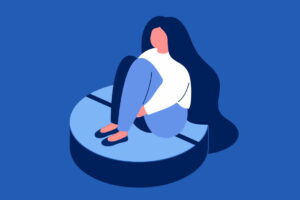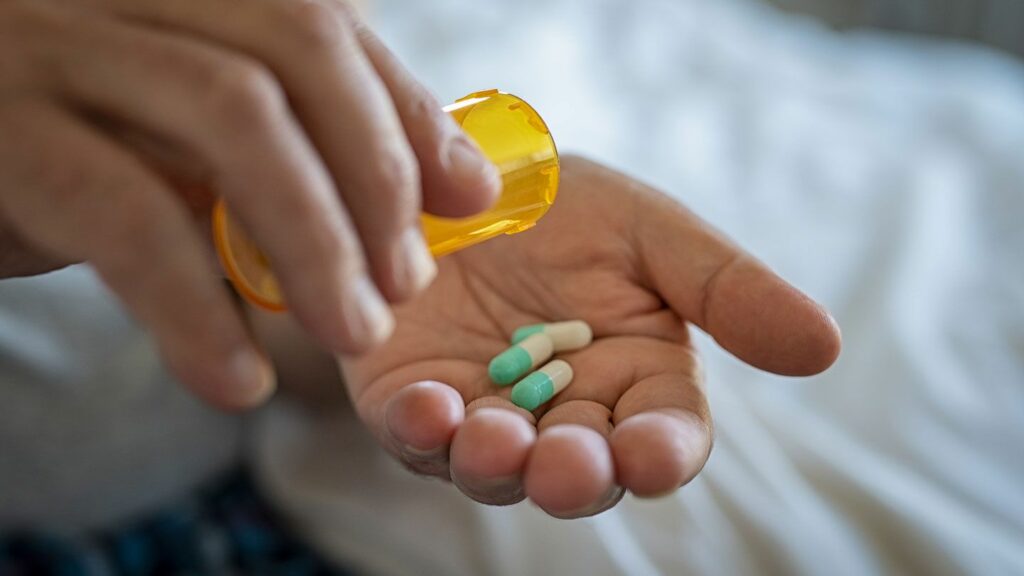Do you feel anxious and self-conscious in social situations? Does the thought of interacting with strangers or speaking in public make your heart race and your palms sweaty? You’re not alone. Social anxiety is a common mental health condition that affects millions of people worldwide. Fortunately, there are medications available to help manage these symptoms. But what is the best drug for social anxiety? In this blog post, we’ll explore some of the most effective options on the market and help you find relief from your social anxiety once and for all.
Contents
What Is Social Anxiety?

Social anxiety disorder (SAD), also known as social phobia, is a mental health condition characterized by an excessive and persistent fear of social situations. People with SAD often experience intense anxiety or discomfort in situations where they feel they are being watched or judged by others, such as speaking in public, attending social events, or meeting new people.
The symptoms of SAD can be debilitating and can significantly impact a person’s quality of life. Fortunately, there are several treatment options available, including therapy and medication.
Best Drugs For Social Anxiety
Social anxiety disorder (SAD) is a common mental health condition that can cause significant distress and impairment in social situations. While medication can be an effective treatment option for SAD, it is important to note that it is not a one-size-fits-all approach, and what works for one person may not work for another. It is important to consult with a healthcare professional before starting any medication for social anxiety disorder. They can help determine the most appropriate treatment plan based on an individual’s specific needs and medical history.
Types of Best Drugs For Social Anxiety
These are some types of best drugs for social anxiety:
Selective Serotonin Reuptake Inhibitors (SSRIs)

Selective serotonin reuptake inhibitors (SSRIs) are a class of antidepressant drugs commonly used to treat SAD. SSRIs work by increasing the levels of serotonin in the brain, which can help regulate mood and anxiety. Some commonly prescribed SSRIs for SAD include:
- Fluoxetine (Prozac)
- Sertraline (Zoloft)
- Paroxetine (Paxil)
SSRIs can take several weeks to start working, and they can have side effects such as nausea, diarrhea, headache, insomnia, and sexual dysfunction. It’s important to discuss the potential risks and benefits of SSRIs with your doctor before starting treatment.
Serotonin-Norepinephrine Reuptake Inhibitors (SNRIs)
Serotonin-norepinephrine reuptake inhibitors (SNRIs) are another class of antidepressant drugs that can be effective in treating SAD. SNRIs work by increasing the levels of both serotonin and norepinephrine in the brain, which can help regulate mood and anxiety. Some commonly prescribed SNRIs for SAD include:
- Venlafaxine (Effexor)
- Duloxetine (Cymbalta)
Like SSRIs, SNRIs can take several weeks to start working, and they can have side effects such as nausea, headache, insomnia, and sexual dysfunction. It’s important to discuss the potential risks and benefits of SNRIs with your doctor before starting treatment.
Benzodiazepines

Benzodiazepines are a class of drugs that can be used to treat anxiety disorders, including SAD. Also, Benzodiazepines work by enhancing the activity of a neurotransmitter called gamma-aminobutyric acid (GABA), which can help reduce anxiety. Some commonly prescribed benzodiazepines for SAD include:
Benzodiazepines can be effective in reducing anxiety symptoms quickly, but they can also be addictive and can cause side effects such as drowsiness, dizziness, and impaired coordination. It’s important to discuss the potential risks and benefits of benzodiazepines with your doctor before starting treatment.
Beta-Blockers
Beta-blockers are a class of drugs that are commonly used to treat high blood pressure and heart conditions. Also, they can be used to treat the physical symptoms of anxiety, such as rapid heartbeat, trembling, and sweating. Beta-blockers work by blocking the effects of adrenaline, which can help reduce the physical symptoms of anxiety. Some commonly prescribed beta-blockers for SAD include:
- Propranolol (Inderal)
- Atenolol (Tenormin)
Beta-blockers can be effective in reducing the physical symptoms of anxiety, but they do not treat the underlying psychological symptoms. It’s important to discuss the potential risks and benefits of beta-blockers with your doctor before starting treatment.
Pregabalin (Lyrica)
Pregabalin, marketed under the brand name Lyrica, is a medication used to treat a variety of conditions, including nerve pain, epilepsy, and anxiety disorders such as social anxiety disorder (SAD). Also, Pregabalin was approved by the US Food and Drug Administration (FDA) in 2004 for the treatment of nerve pain and in 2007 for the treatment of fibromyalgia. It was later approved in 2012 for the treatment of generalized anxiety disorder (GAD) and in 2019 for the treatment of SAD.
Pregabalin is classified as an anticonvulsant and anxiolytic medication. Its mechanism of action is not fully understood, but it is believed to work by reducing the release of certain neurotransmitters, such as glutamate and substance P, in the brain. These neurotransmitters are involved in the transmission of pain and anxiety signals, and reducing their release can help alleviate pain and anxiety symptoms.
Pros and Cons of Drugs For Social Anxiety
Several types of drugs can help alleviate the symptoms of SAD. Here are some of the pros and cons of using drugs for social anxiety:
Pros

- Effective in reducing anxiety symptoms: Drugs can be effective in reducing the symptoms of anxiety, such as sweating, trembling, and racing thoughts. They can also help improve mood and overall quality of life.
- Quick relief: Some drugs, such as benzodiazepines, can provide quick relief from anxiety symptoms, making them a useful tool for managing acute anxiety.
- May be used in conjunction with therapy: Drugs can be used in conjunction with therapy to help manage SAD symptoms. This can provide a more comprehensive treatment approach.
- Variety of options: There are several types of drugs available to treat SAD, including SSRIs, SNRIs, benzodiazepines, beta-blockers, and pregabalin. This allows for individualized treatment based on a person’s specific needs and preferences.
Cons
- Side effects: All drugs have potential side effects, and drugs used to treat SAD are no exception. Side effects can include nausea, diarrhea, headache, insomnia, sexual dysfunction, drowsiness, dizziness, and weight gain.
- Dependency: Some drugs, such as benzodiazepines, can be addictive and may lead to dependency if used for prolonged periods.
- Interactions with other medications: Drugs used to treat SAD can interact with other medications, so it is important to inform your doctor of any other medications or supplements you are taking.
- Cost: Drugs used to treat SAD can be expensive, especially if they are not covered by insurance.
- Not a cure: Drugs can help manage SAD symptoms, but they do not cure the underlying condition. It is important to continue with therapy and other lifestyle changes to effectively manage SAD in the long term.
Alternatives of Drugs For Social Anxiety

While drugs can be effective in treating SAD, they are not the only treatment option. Here are some alternative treatments for social anxiety:
- Cognitive-behavioral therapy (CBT)
CBT is a type of talk therapy that focuses on changing negative thought patterns and behaviors that contribute to anxiety. CBT can help individuals with SAD learn coping strategies to manage their anxiety and improve their social skills.
Exposure therapy is a type of therapy that involves gradually exposing an individual to the situations or objects that trigger their anxiety. This exposure is done in a controlled setting, with the guidance of a therapist, and can help individuals with SAD learn to tolerate and manage their anxiety in real-life situations.
- Mindfulness and relaxation techniques
Mindfulness and relaxation techniques, such as meditation, deep breathing, and progressive muscle relaxation, can help reduce stress and anxiety levels. Practicing these techniques regularly can help individuals with SAD manage their symptoms in everyday life.
- Lifestyle changes
Making healthy lifestyle changes, such as getting regular exercise, eating a healthy diet, and getting enough sleep, can help improve overall well-being and reduce anxiety levels. Reducing caffeine and alcohol intake can also help reduce anxiety symptoms.
Joining a support group or attending group therapy sessions can provide individuals with SAD with a safe and supportive environment to discuss their experiences and learn from others.
Conclusion
Drugs can be a useful tool in managing the symptoms of social anxiety disorder. They can provide quick relief and may be used in conjunction with therapy to provide a comprehensive treatment approach. However, it is important to be aware of the potential side effects, interactions with other medications, and the risk of dependency. It is also important to note that drugs do not cure SAD and should be used as part of a larger treatment plan that includes therapy and lifestyle changes. As with any medication, it is important to discuss the potential risks and benefits with your doctor before starting treatment.
For more information, please contact MantraCare. Anxiety is a common mental health condition characterized by persistent feelings of worry, fear, and apprehension. If you have any queries regarding Online Anxiety Counseling experienced therapists at MantraCare can help: Book a trial Anxiety therapy session


